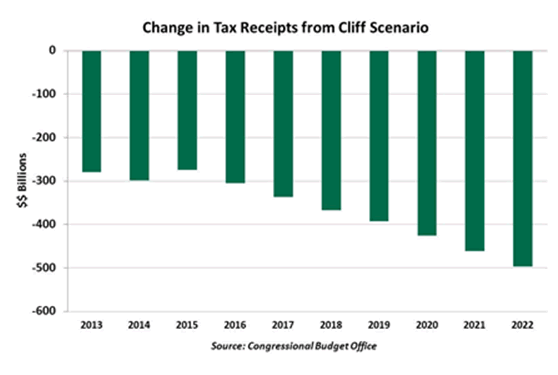Fiscal Cliff Averted, But Debt Ceiling Looms
Politics / US Debt Jan 03, 2013 - 04:12 AM GMTBy: Asha_Bangalore
 Happy new year to all!
Happy new year to all!
We host an open house each January 1. Breakfast is served starting at 9, lunch at 1, and cauldrons of homemade soup at 5:30. By 8, hopefully, the assembled multitude is hale, hearty, and ready to live up to their New Year’s resolutions.
College football bowl games provide considerable entertainment during the day. Yesterday, the group was riveted to the back and forth of the action, with outcomes in doubt right up until the last moment. For most of my guests, the attention was focused on Stanford versus Wisconsin. For me, the play-by-play from Congress was of utmost importance.
At the 13th hour, legislators passed the American Taxpayer Relief Act of 2012. The ink is scarcely dry, so we’ll be poring through the details in the coming days for insights that will appear in Friday’s weekly. Some early reaction:
•The accord does take a firm step towards tax certainty. While both sides have suggested that they’d like to revisit issues at the fringe of the tax code, the core has been solidified. We have clarity on marginal rates. As we anticipated, dividends and capital gains will still be taxed at rates lower than those applied to income. The alternative minimum tax (AMT) has been patched more permanently.
The lack of transparency around these issues has been a hindrance to economic activity. With better definition, investors and business people should be able to look ahead more cogently. And the Internal Revenue Service can begin amending forms and instructions to get ready for April 15.
As the chart below shows, the Act cut tax proceeds substantially from the path that would have prevailed under existing law:

The relief afforded to taxpayers, though, represents a reduction in expected revenue for the US Treasury. A key calculation will be what impact the Act will have on the course of economic growth in the years ahead, and on the associated size of the tax base.
•There will still be a drag on consumers that emerges from the updated tax code. Rates will rise on higher-income taxpayers, and all wage earners will be impacted by the reversion of payroll taxes to their 2010 levels. It’s hard to know when all of this will sink in, as the change will become prominent only as 2013 pay stubs are printed and withholding rates are altered.
•The resolution only tackles one side of the fiscal equation, setting the stage for a second round of potentially contentious discussions. The actions taken yesterday actually increase Federal spending by deferring automatic cuts for two months. That timing coincides with the likely exhaustion of room under the Federal debt ceiling, compliance with which is currently being maintained through the use of some cash management sleight of hand.
 It’s difficult to be optimistic about this next phase, given the challenges that were encountered during the last two weeks of 2012. One could certainly be encouraged that yesterday’s result represented substantial compromise for both sides. One could also note that those dissatisfied with the Act will want to avoid being disappointed again.
It’s difficult to be optimistic about this next phase, given the challenges that were encountered during the last two weeks of 2012. One could certainly be encouraged that yesterday’s result represented substantial compromise for both sides. One could also note that those dissatisfied with the Act will want to avoid being disappointed again.
•The Act does reinstate curbs on deductions for upper-income taxpayers. It’s too early to tell whether this step will have a deleterious impact on the housing market, charities, or other sectors sensitive to tax preferences. More on this to come.
As of this writing, the equity markets seem pleased that the cliff has been averted. But does yesterday’s accord mean that the economic outlook for 2013 is significantly better than what forecasters were expecting? Will we see a release of economic energy now that the worst case is off the table?
Our initial read is that it will be hard for consumers, firms, and investors to become significantly more upbeat in light of what’s ahead. Unfortunately, we likely are in for two more months of sharp statements, challenging headlines, and associated market volatility. After the high comes the hangover, and there isn’t enough chicken soup in my kitchen to sooth the 113th Congress.
Asha Bangalore — Senior Vice President and Economist
http://www.northerntrust.com
Asha Bangalore is Vice President and Economist at The Northern Trust Company, Chicago. Prior to joining the bank in 1994, she was Consultant to savings and loan institutions and commercial banks at Financial & Economic Strategies Corporation, Chicago.
Copyright © 2013 Asha Bangalore
The opinions expressed herein are those of the author and do not necessarily represent the views of The Northern Trust Company. The Northern Trust Company does not warrant the accuracy or completeness of information contained herein, such information is subject to change and is not intended to influence your investment decisions.
© 2005-2022 http://www.MarketOracle.co.uk - The Market Oracle is a FREE Daily Financial Markets Analysis & Forecasting online publication.



